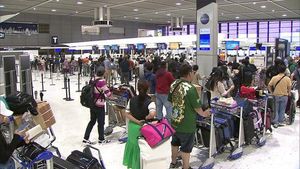Donald Trump has made headlines once again by revoking Secret Service protection for Hunter Biden and Ashley Biden, the children of President Joe Biden. The announcement came as part of a larger narrative involving the former president's ongoing tensions with the current administration and raised several questions about the ethics behind the decision.
Under federal law, former presidents and their spouses receive lifelong Secret Service protection. However, the protection for their immediate family members over the age of 16 typically ends when they leave office. Trump, during his presidency, extended the protection for his own children before his term ended. His decision to revoke Biden's children's protection is raising eyebrows and leading many to wonder what prompted this change.
The timing of Trump's announcement comes after he was touring the John F. Kennedy Center for the Performing Arts on March 17, 2025. When asked by a reporter about Hunter Biden's protection, Trump indicated that he needed to look into it, stating, "Well, we have done that with many. I would say if there are 18 with Hunter Biden, that will be something I'll look at this afternoon."
On the same day, Trump then declared that he was revoking the Secret Service assigned to Hunter and Ashley Biden, effective immediately. This sudden decision occurred just weeks after Biden had extended protection for his children in July, a temporary measure meant to last until the end of his term.
Critics have voiced concerns about the implications of this move, suggesting it may be a retaliatory action stemming from a divisive political climate. The debate regarding who deserves Secret Service protection and for how long is becoming increasingly contentious, especially as costs for these security measures escalate. The Secret Service's total budget for 2024 aimed at protection was nearly $1.5 billion, a significant burden on taxpayers.
It's important to note that while Trump's family members currently have protection, including his grandchildren, other prominent individuals who have previously held this protection, such as Chelsea Clinton, no longer do. This inconsistency in protection policies highlights uncertainty surrounding the criteria used to assign Secret Service details.
During his presidency, Biden had made similar moves to extend protection for Trump's son Barron, highlighting a cooperative spirit that seems to contrast sharply with Trump's recent actions. Such decisions suggest a shifting landscape in the administration's handling of security and the potential for political motivations behind these choices.
The Secret Service, through spokesperson Anthony Guglielmi, stated they would comply with the president's directive while ensuring a seamless transition of protective details. However, the agency refrained from discussing specific threats or concerns regarding Hunter and Ashley Biden's safety. The ongoing debates in Congress regarding the cost-effectiveness of security measures further complicate the discourse surrounding these decisions.
The sudden revocation of protection for Hunter Biden has ignited discussions about the fiscal responsibilities associated with maintaining a large delegation of security personnel. Hunter's travels, which included a recent trip to South Africa, had previously prompted critiques about the necessity for so many agents, particularly when the Secret Service is facing staffing shortages and high operational demands during the ongoing presidential campaign season.
Ex-Secret Service agent Jason Russell expressed that such decisions should ideally be predicated on actual threats, not political motives. "Politics should not come into this in any way," he asserted, further supporting the idea that protective measures must prioritize public safety above all else.
As Trump continues to grapple with the ramifications of his decisions, questions remain regarding how protective details are assigned and who ultimately decides these matters. Current and former officials have emphasized that the criteria should prioritize security over politics.
The broader implications of Trump’s choices extend beyond just the Biden family. He has faced backlash for similar removals in the past, creating an unspoken tension within the government. For instance, he previously stripped protection from national security adviser John Bolton and other former aides shortly after taking office, which raised concerns among lawmakers.
In a politically charged environment where threats and violence have escalated, Congress members like Representative Jamie Raskin have stressed that security decisions should be made with discretion to avoid unnecessary risks to individuals. The intricate dynamics within the Secret Service, alongside the pressures of safeguarding public figures, paint a picture of a system that must balance the intricacies of politics and security.
Trump's proclamation and the ensuing deliberations reflect the ongoing discourse about the ethical considerations that funders of the Secret Service face. As public protectors grapple with challenges in staffing and funding, the complexities of political affiliations further accentuate the urgent need for clarity and reform regarding the assignment of protection.
As we move further into a politically charged climate, the need for transparency and accountability in how secret service protections are allocated becomes ever more pressing. With the public's safety in the balance, the administration's forthcoming decisions surrounding security allocations will warrant close scrutiny.






